Study shows consumer preferences amid pandemic [2020 Survey]

A little over a week ago we ran a study in conjunction with SurveyMonkey across US residents to understand how the pandemic has impacted online shopping behavior.
Some results were surprising while others further emphasized prior behaviors that have been measured in other studies before the pandemic.
Newly unemployed or furloughed people are shopping online more
We first wanted to know how the pandemic has impacted employment among the respondents, so we asked "Are you unemployed or furloughed due to the economic impact of COVID-19?" and 37% said yes.
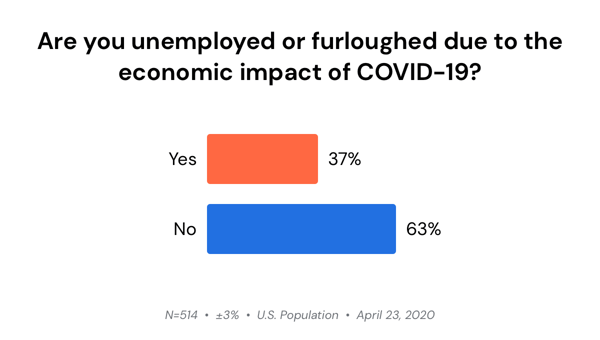 We then asked if they were doing more shopping overall online since March 1st, and 64% said yes.
We then asked if they were doing more shopping overall online since March 1st, and 64% said yes.
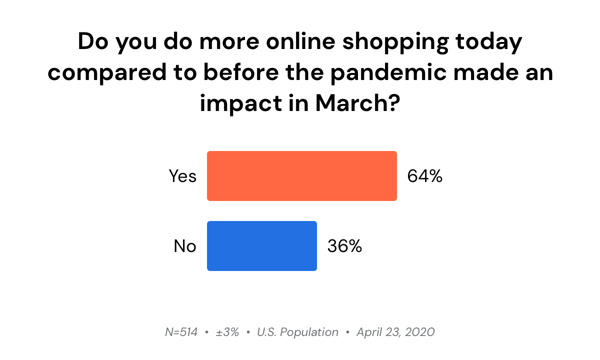
What’s interesting is when correlating the two questions. Of the 37% that said they are currently unemployed or furloughed, 71% of that dataset said they are now shopping more online than before.
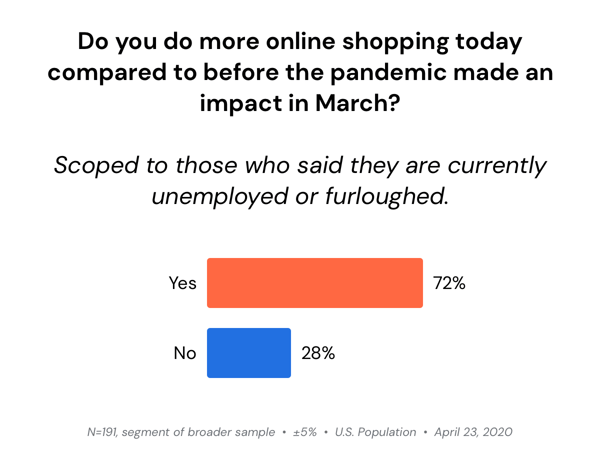 The causation for increased online shopping is quite obvious, as lockdown orders have been in place in most localities for the past two months making it less likely people will go to a physical store to shop. What's interesting is how many unemployed or furloughed people are still shopping per usual, and have migrated to online habits.
The causation for increased online shopping is quite obvious, as lockdown orders have been in place in most localities for the past two months making it less likely people will go to a physical store to shop. What's interesting is how many unemployed or furloughed people are still shopping per usual, and have migrated to online habits.
The takeaway has less to do with right now, May 2020, and more to do with the future.
We know from our experience at Amazon that the 2008 recession had an enormous long-term positive impact at Amazon.com. Millions of consumers flocked to the site for the first time ever due to price sensitivity. As they became familiar with the site's selection, navigation, and trustworthiness, those consumers stuck even after the recession receded.
We predict this will happen again post-pandemic for all ecommerce retailers who are attracting new customers during the lockdown. The data demonstrates that even unemployment isn't stopping new customer acquisition, which bodes well for long-term retention.
Trustworthiness matters with ecommerce
Familiarity with Amazon after the 2008 recession led to long-term customer loyalty. The dynamic is playing out again now.
We asked respondents to pick the two most important factors when considering an online purchase.
The number one response at 55% was "Trustworthiness or familiarity with the company."
How do ecommerce sites develop trustworthiness?
Much of it is brand, to which newer ecommerce companies are doing a great job focusing on sustainability, transparency of materials, and so forth.
The individual customer experience while shopping matters, too. Simple hacks like providing an accurate delivery date up front, or constant communication of a package's whereabouts all add up. A "premium" delivery experience has now become an expected experience.
Free shipping is a major reason for online purchases
Previous studies had already shown free shipping as a top reason consumers make a purchase decision online.
Our study had 78% come back with "Strongly Agree" or "Agree" for the statement "Free shipping on retail websites determines whether or not I make a purchase." That's really high!
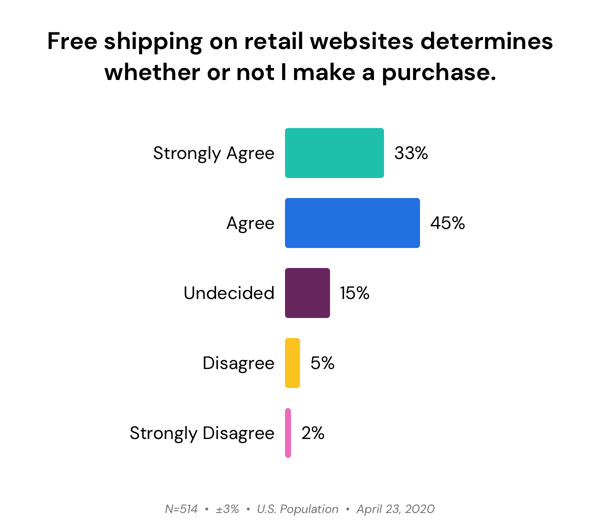
Now more than ever, retailers need to figure out how to finance free shipping programs in order to increase cart conversion or long-term customer loyalty.
One way to do that is look for "found money" throughout the supply chain as a way to finance cheaper or free shipping options. A simple algorithmic decision for outbound carrier method could shave off as much as $1/unit, for example.
Customers don't want to wait
Just over half (51%) said they wouldn't wait more than 5 days to receive something they bought online. We already knew consumers have been conditioned to expect faster shipping, but over half unwilling to wait longer than 5 days shows this is increasingly becoming a standard expectation.
The question "What is the longest delivery time you are willing to accept when shopping online?" broke down like this under 5 days:
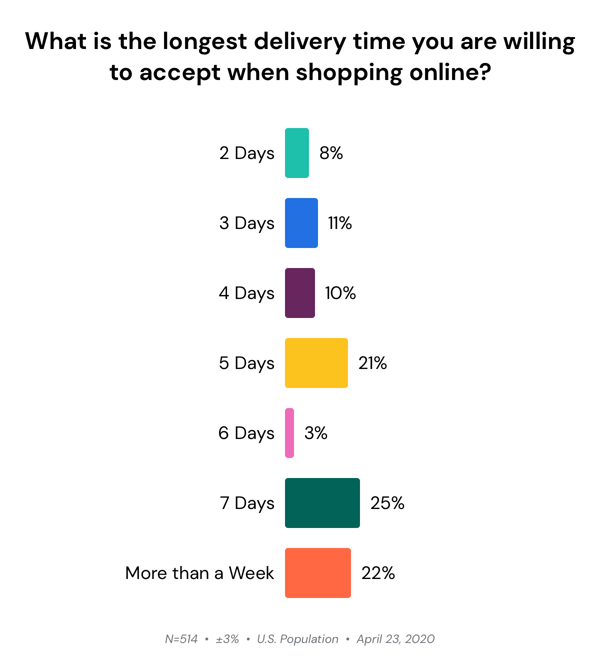
Think about that: close to a third of online shoppers don't want to wait more than 4 days for their package or else they will shop somewhere else. Similar to free shipping, faster shipping is becoming a necessary option to maximize potential market share.
The easiest and most impactful way to nudge a sale? Be transparent about delivery
Studies have already shown that an accurate delivery date could improve cart conversion as high as 12%.
When we asked "An accurate delivery date (i.e. “Buy it today, get it Thursday”) is important to me when deciding whether to buy a product from a website." 83% said "Strongly Agree" or "Agree"!
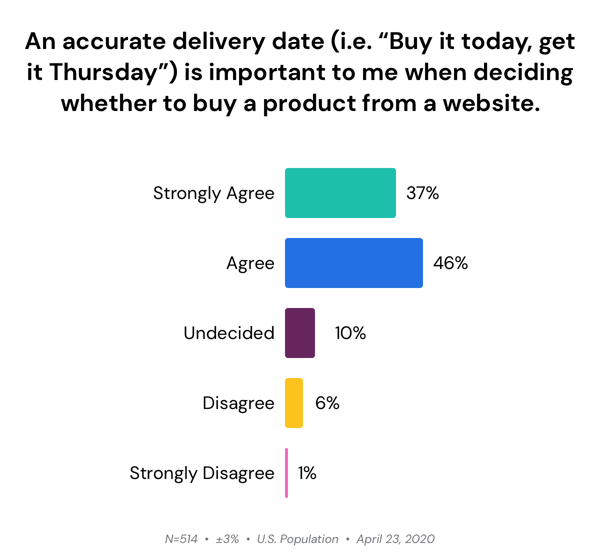 This continues to be one of the most untapped low-hanging-fruit improvements an ecommerce seller can do to improve revenue and customer satisfaction.
This continues to be one of the most untapped low-hanging-fruit improvements an ecommerce seller can do to improve revenue and customer satisfaction.
Price is still important, but the full shopping experience still matters more
When asked "How important is price when shopping online?" 34% answered "The lowest price is the most important factor for an online purchase." while 66% answered "Price matters, but it is not the most important factor compared to other factors like selection, delivery, familiarity, trust or convenience."
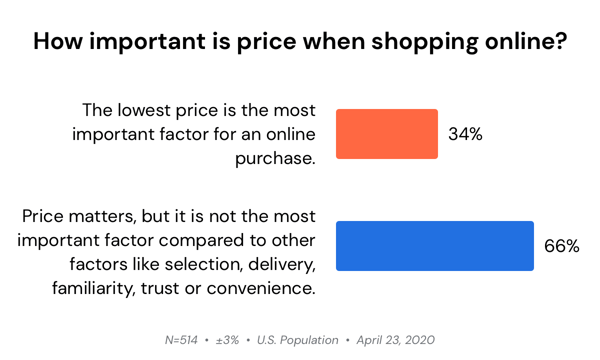
The instability of the pandemic is certainly driving price sensitivity, but it's not quite as much as we were expecting.
Unlike the price sensitivity spike in the 2008 recession, it looks like a focus on customer experience continues to be as important of a competitive aspect as overall price, even in these complex and trying times.

Diagonal thinker who enjoys hard problems of any variety. Currently employee #5 and the first business hire at Shipium, a Seattle startup founded by Amazon and Zulily vets to help ecommerce companies modernize their supply chains. Previously was CMO at Datica where I helped healthcare developers use the cloud. Prior to that I came up through product and engineering roles. In total, 18 years of experience leading marketing, product, sales, design, operations, and engineering initiatives within cloud-based technology companies.


